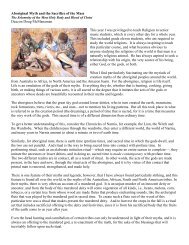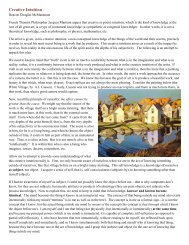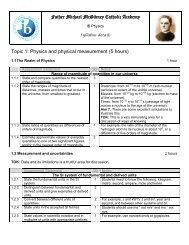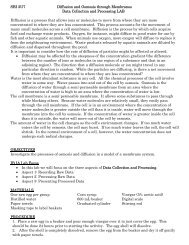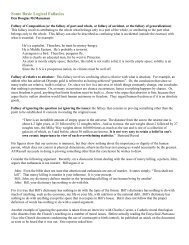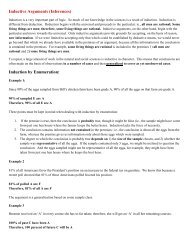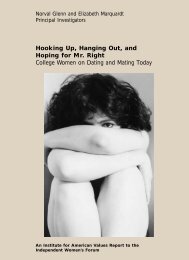"The Basic Ideas of Mircea Eliade's The Sacred and the Profane"
"The Basic Ideas of Mircea Eliade's The Sacred and the Profane"
"The Basic Ideas of Mircea Eliade's The Sacred and the Profane"
You also want an ePaper? Increase the reach of your titles
YUMPU automatically turns print PDFs into web optimized ePapers that Google loves.
sun. If, by some chance, that time were shortened by one week to 358 days <strong>and</strong> we did<br />
not alter <strong>the</strong> calendar, within a dozen years <strong>the</strong> first day <strong>of</strong> spring would fall on what is<br />
now <strong>the</strong> first day <strong>of</strong> winter.<br />
When you measure time by space, you see how much goes in cycles. Every day <strong>the</strong> sun<br />
rises, climbs into <strong>the</strong> sky, hits its peak, descends, sets, disappears, <strong>and</strong> <strong>the</strong>n rises <strong>the</strong> next<br />
day. Every month <strong>the</strong> moon waxes <strong>and</strong> wanes; every year <strong>the</strong> earth goes through <strong>the</strong><br />
cycle <strong>of</strong> <strong>the</strong> seasons. This led some traditional societies to speak <strong>of</strong> time itself as cyclical<br />
(e.g., Hindu culture). Eastern cultures in general are inclined toward this view <strong>of</strong> time.<br />
Because <strong>of</strong> <strong>the</strong> Biblical tradition, Western cultures view time as linear, that is, when<br />
something happens, it has happened once <strong>and</strong> for all. Similar things might happen again,<br />
but <strong>the</strong>y are not identical. <strong>The</strong>y may be coincidences or be caused by similar<br />
circumstances.<br />
Eliade suggested that traditional societies see <strong>the</strong> forces <strong>of</strong> <strong>the</strong> earth recurring on a regular<br />
basis without change. Obviously, <strong>the</strong>re might be individual changes as rivers changed<br />
<strong>the</strong>ir courses or plants grew where seeds had been planted, but <strong>the</strong> overall cycle <strong>of</strong> life<br />
was unchanging.<br />
This leads to a central point in <strong>Eliade's</strong> <strong>the</strong>ory. <strong>The</strong> great event, as we noted above, is <strong>the</strong><br />
cosmogony, when <strong>the</strong> Gods created <strong>the</strong> world. For societies which share this cyclical<br />
view <strong>of</strong> time (where <strong>the</strong> world moves through cycles), <strong>the</strong> cosmogony was repeated<br />
annually. We have already seen that a cosmogony means a creation <strong>of</strong> a cosmos, an<br />
ordered world. In <strong>the</strong> cycle <strong>of</strong> <strong>the</strong> seasons, winter represents chaos, <strong>the</strong> time when <strong>the</strong><br />
earth is dying (although in this case chaos is a preparation for cosmos). In <strong>the</strong> spring, <strong>the</strong><br />
world comes back to life, cosmos has returned. In traditional societies, New Year's rites<br />
usually take place in <strong>the</strong> spring because that is when <strong>the</strong> year actually begins. (Our own<br />
calendar reflects this slightly. <strong>The</strong> word September means <strong>the</strong> seventh month because in<br />
<strong>the</strong> old Roman calendar <strong>the</strong> first month was March.)<br />
Eliade fur<strong>the</strong>r suggested that this belief in <strong>the</strong> annual repetition <strong>of</strong> <strong>the</strong> cosmogony<br />
resulted in several now-familiar religious customs. For example, as <strong>the</strong> time for <strong>the</strong><br />
festival approached, <strong>the</strong> entire world went into decline <strong>and</strong> returned to chaos. This meant<br />
that, at <strong>the</strong> New Year, <strong>the</strong> entire world <strong>and</strong> <strong>the</strong> people in it were born again. <strong>The</strong> basic<br />
idea behind this is that people are part <strong>of</strong> <strong>the</strong> natural world <strong>and</strong> are caught up in <strong>the</strong><br />
movement <strong>of</strong> nature; if <strong>the</strong> world is renewed, so are we. <strong>The</strong> cleansing <strong>of</strong> <strong>the</strong> "old leaven"<br />
before Passover for Jews, <strong>and</strong> <strong>the</strong> kindling <strong>of</strong> <strong>the</strong> "new fire" at <strong>the</strong> Christian Easter Vigil<br />
are two example <strong>of</strong> religious traditions based on this idea.<br />
This idea that time can begin again <strong>and</strong> we, as part <strong>of</strong> nature, are caught up in this return<br />
to <strong>the</strong> cosmogony may sound like a cosmic time machine, but that is not really what this<br />
means. We find ideas like this in everyday language <strong>and</strong> customs. For example, if you<br />
become run down <strong>and</strong> constantly fatigued (probably from reading too much about<br />
Eliade), a physician may tell you to get some recreation. Look at what <strong>the</strong> word means:<br />
re-creation, that is, to be created again. Similar words are renew, to become new again,



